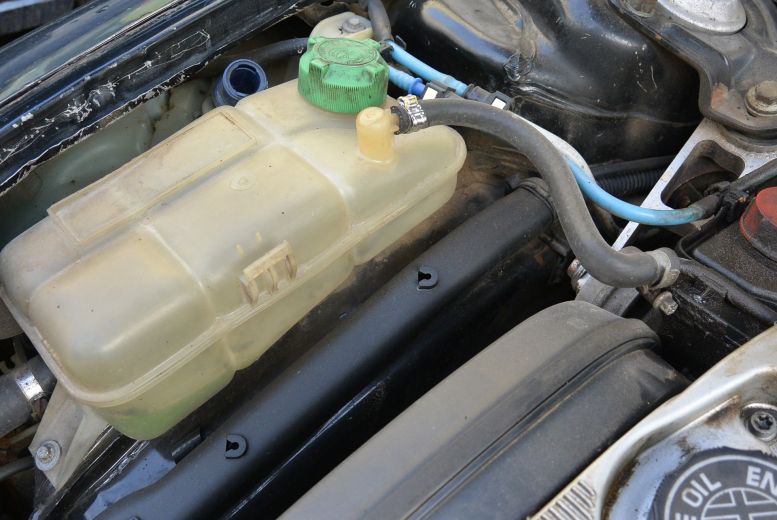Here we’ll help you to identify any problems with your engine coolant or coolant system by looking at everything from different coolant formulas, to how often you should check it and what to do if you suspect something is wrong.
How do you check your engine coolant?
Check your vehicle handbook for the location of the coolant filler cap – the advice given may vary from car to car.
Always ensure the engine is cool before you open the filler cap – pressurised hot water can build up inside.
Make sure the coolant is between the min and max marks on the side of the tank.
What is engine coolant?
Engine coolant is a water-based liquid which keeps your car’s engine from overheating by regulating the temperature.
Running your engine produces a great deal of energy which is converted into either power – to move the vehicle forward – or heat.
While some of the heat energy is expelled via the exhaust, the remaining heat energy stays inside the engine.
Coolant flows through passages in the engine and absorbs this heat. It is then transferred to the car’s radiator where it is cooled down by air flow as the car moves.
If the vehicle is stationary, a fan will maintain the airflow to reduce the coolant’s temperature.
The coolant itself is a mixture of ethylene or propylene glycol and water, usually in a 50/50 ratio.

RAC Breakdown Cover from £7 a month*
*£7 a month for new single vehicle Basic cover. Comparison based on www.theaa.com closest equivalent cover as at 19/04/24.

How regularly should you check your engine coolant?
You need to check your engine coolant at least twice a year before summer and winter, ideally. Although, this advice may vary between car manufacturers.
Coolant should be topped up whenever the level drops below the guide marks.
When it comes to draining and changing the coolant altogether, manufacturers guidance also varies although this can be after a minimum of 30,000 miles depending on how old your car is.
If you notice any rust or discolouring in your coolant – it will need to be changed straight away.
Can you top your coolant up with water?
Coolant should only be topped up with water in case of an emergency when the coolant liquid level is lower than it should be.
While topping up with water will help you get safely to the nearest RAC Approved Garage and identify any issues, it shouldn’t be relied upon. If you are struggling with car maintenance - contact your local mobile mechanic.
Adding a little water to coolant shouldn’t do any real damage but adding too much will lower its boiling point and stop the coolant from working as efficiently.
What is antifreeze?
Engine coolant is also commonly referred to as antifreeze. While coolant is used to maintain the engine’s temperature all year round – most good quality coolants also have anti-freeze properties to keep the coolant functioning in sub-zero temperatures.
Always check the label of products. ‘Coolants’ will usually come pre-mixed with antifreeze and are ready to use straight away. This is why the names ‘coolant’ and ‘antifreeze’ are often used interchangeably.
Other ‘antifreeze’ liquids will need to be diluted with 50% water before use or as the label dictates.
Antifreeze also helps prevent scale build up and corrosion inside passages.
How do you know if there is a problem with your engine coolant?
Your dashboard thermometer will start to show a hotter than normal reading – meaning your car engine is overheating.
The thermometer light on your dashboard will also activate.
While it could mean your coolant is leaking – this isn’t always the case.
Firstly, check if the coolant levels are lower than they should be. If the level is too low – look for leaks on all hoses, clamps and seals.
The older the vehicle, the more susceptible parts of the hoses and seals will be.
If you find your coolant level repeatedly falls below the guidelines this usually indicates a leak.
Other causes of coolant running down could be a loose radiator cap which is allowing it to escape, a faulty warning sensor or a blocked radiator. Take your car to a garage if you need a service, repair, or general advice.
Whether you’re able to spot the source of the issue or not, it’s important to take your vehicle to be checked over as soon as possible if you find your coolant level keeps dropping.
READ MORE: Driving habits that are secretly damaging your car
What should you do if you think your car is overheating while you’re driving?
Firstly, you should switch off the air conditioning as this puts extra strain on the engine. Driving in stop start traffic will only exacerbate the problem so do your best to keep the car moving smoothly until you can get to a safe place to stop or to a mechanic.
Always wait for the engine to cool before opening the bonnet and checking coolant levels.
FAQs
What does anti freeze coolant do?
Anti freeze coolant, also known as engine coolant, is a liquid used to keep engines from overheating. It is typically a mixture of 50% water and 50% ethylene glycol or propylene glycol, with other additives for corrosion protection and lubrication.
When mixed with water, the coolant helps to lower the freezing point of the water and raise the boiling point, allowing the engine to function in a wider range of temperatures.
It also helps to absorb heat from the engine, helping to keep it at a consistent temperature. In addition, it helps to protect the engine from corrosion caused by extreme temperatures and chemicals found in the air.
Are coolant and anti freeze the same?
Coolant is a liquid mixture used in vehicles to remove heat from the engine and cooling system. It is usually composed of a mixture of water and glycol-based (antifreeze) chemicals, and may also contain rust inhibitors, dyes, and other additives.
Anti-freeze, on the other hand, is a chemical solution used to lower the freezing point of a liquid, in this case, the coolant. It is typically composed of ethylene glycol or propylene glycol, as well as other chemicals and additives.
While coolant and anti-freeze are both used in an automobile's cooling system, they are not the same and serve different purposes.
If your MOT is due or if you would like to book your vehicle in for a full car service, you can book online with your local RAC Approved Garage today.
Get 30 driving tips that will save you money
Running a car isn’t cheap, but there are some easy things you can do to keep your costs down. Get these tips and more useful driving articles sent straight to your inbox now.


Services we offer
- Breakdown Cover
- European Breakdown Cover
- Motorbike Breakdown Cover
- Electric Car Breakdown Cover
- Caravan, Motorhome and Campervan Breakdown Cover
- Business Breakdown Cover
- Van Breakdown Cover
- RAC Approved Garages
- Vehicle servicing
- Vehicle repair
- MOTs
- Mobile mechanics
- RAC Tyres
- RAC Approved Dealers
- RAC Warranty
- RAC Shop
- myRAC app












